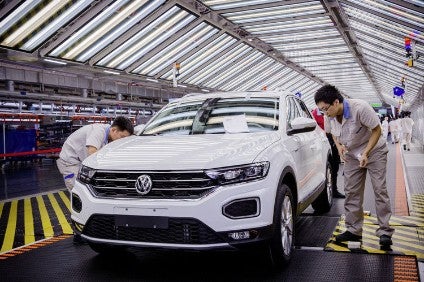
New vehicle sales in China declined just slightly in December 2019, by 0.1% to 2.66m units, according to wholesale data released by the China Association of Automobile Manufacturers (CAAM). The data includes all types of vehicles, including passenger vehicles, trucks and buses.
That was a marked improvement on the market's performance earlier in the year and may be a sign that sales are beginning to bottom out after nearly two years of decline.

Discover B2B Marketing That Performs
Combine business intelligence and editorial excellence to reach engaged professionals across 36 leading media platforms.
In the whole of 2019, overall vehicle sales declined by 8.2% to 25,769,000 units after dropping by 2.8% to 28,081,000 units in 2018.
Economic growth in the country continued to decline throughout the year with the latest government data suggesting GDP expanded by just 6% in the third quarter, compared with 6.2% in the second quarter and 6.4% in the first quarter.
It was the slowest rate of expansion since 1992, with domestic sentiment affected by the prolonged trade war with the US and weakening global demand.
Sales of passenger vehicles declined by 9.6% to 21.43m units while sales of commercial vehicles were just slightly lower at 4.34m units. A separate report showed heavy duty truck sales rose by 2% to a record 1.17m units last year.
At the beginning of July 2019, 15 Chinese cities and provinces, accounting for a combined 60% of total vehicle sales in the country, introduced stricter emission standards earlier than the central government's 2020 deadline which local analysts said weakened the market considerably last year.
Despite encouraging signs in December, CAAM cautiously expects total vehicle sales to fall by a further 2% in 2020 due slowing economic growth and the ongoing trade friction between China and the US.
Last week Miao Wei, the minister for industry and information technology, was also cautious with his market outlook, predicting sales would bottom out in either 2020 or 2021 before rebounding strongly.
New Energy Vehicles
Sales of new energy vehicles (NEVs), mostly electric and plug-in hybrid vehicles, declined by 4.0% to 1.206m units last year from 1.256m in 2018, reflecting a sharp decline in the second half of the year after the government cut subsidies in June.
Chen Shihua, deputy secretary general of the association, told local reporters "due to the small scale of the NEV segment, new energy vehicle manufacturers are losing money. The sharp fall following the subsidy cuts shows the segment is still in need of policy support – at least measures that encourage NEV usage".
Wei said separately the central government would not make further significant NEV subsidy cuts this year to allow the segment to stabilise and to ensure its healthy development.
To date, 3.8m NEVs have been sold in China.
Manufacturer performance
German automakers substantially outperformed the overall Chinese vehicle market last year.
According to local reports, Volkswagen's sales were estimated to have risen by 1.7% to 3.2m units in 2019 while BMW's sales were understood to have increased by over 13% to 723,000 and Mercedes-Benz was up by over 6% to an estimated 693,000.
Audi sales rose 4.2% to a record 688,888 units in 2019, including 58,088 imports, according to local joint venture FAW-Volkswagen Automobile.
General Motors' joint ventures in China reported a more than 15% sales drop to a combined sales to 3.1m units last year with Baojun and Chevrolet its worst performing brands.
Ford sales declined by 26% to 567,854 units with the Ford brand dropping over 34% to 328,315.






